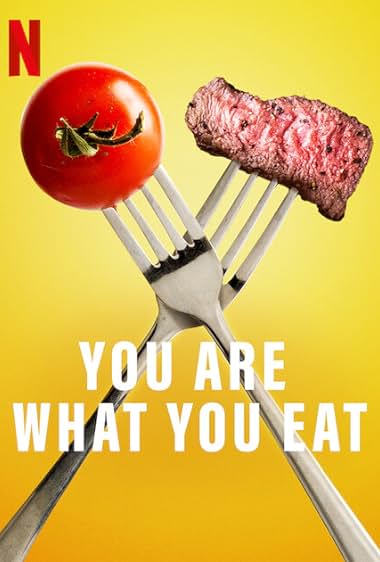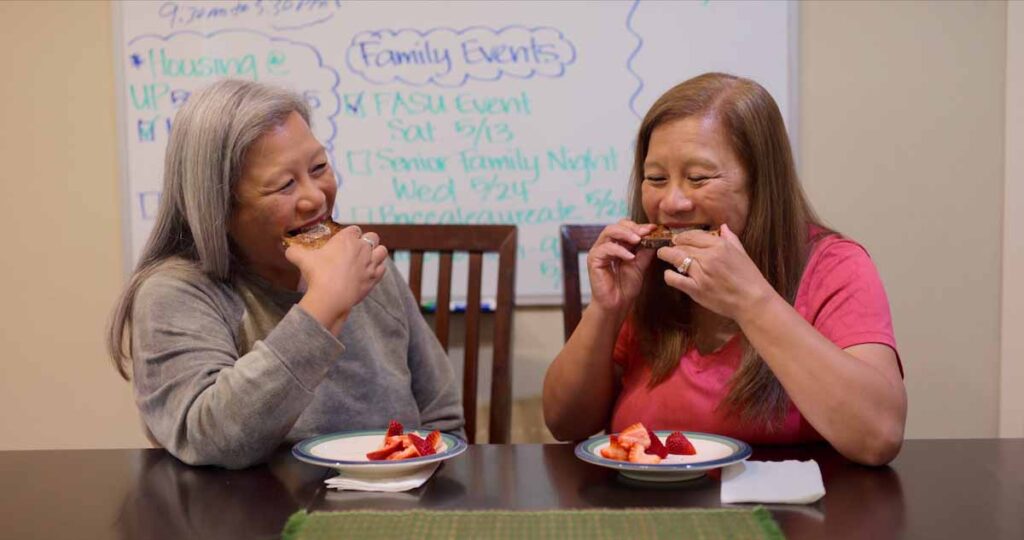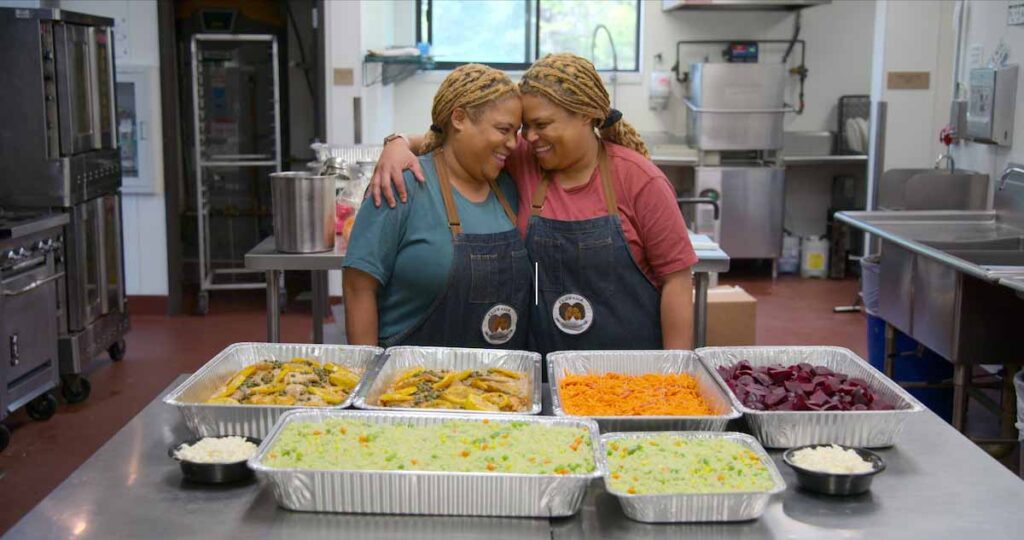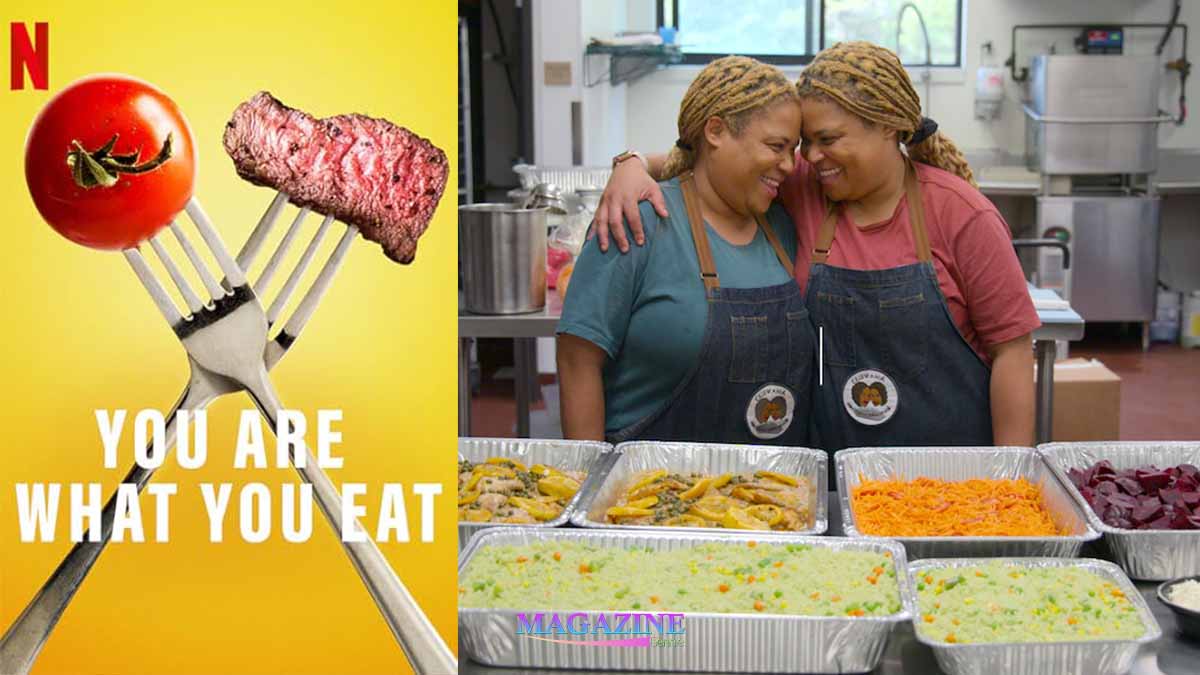
You Are What You Eat: A Twin Experiment (TV Mini-Series, 2024):
This is a recently released four-part docuseries on Netflix that follows four sets of identical twins as they experiment with different diets for eight weeks. Each pair adopts a contrasting dietary approach, like vegan vs. omnivore or pescatarian vs. high-fat. The series then documents the physical and mental changes they experience throughout the experiment, exploring how dietary choices impact health, body composition, and even personality.
Table of Contents
You are What You Eat A Twin Experiment Cast

Here is a concise summary of the key information about the cast of the Netflix documentary series “You Are What You Eat: A Twin Experiment”:
Pam and Wendy Drew
- Pam followed the plant-based diet, while Wendy had the meat-eating diet during the study.
- After the study, they both now consume less meat than before, with cheese as an occasional treat.
Charlie and Michael Kalish
- Charlie ate meat before the study, and switched to a plant-based diet during the experiment.
- Michael was a pescatarian before and followed a meat-eating diet during the study.
- After the study, Charlie is now almost 90% vegetarian, and Michael is fully vegetarian.
John and Jevon Whittington
- Both ate meat before the study, but have since mostly stopped eating red meat.
- They now eat more plant-based foods like fruits, vegetables, fish, and beans.
Carolyn Sideco and Rosalyn Moorhouse
- Both ate meat before the study. During the study, Carolyn switched to a plant-based diet while Rosalyn continued eating meat.
- After the study, they both still eat meat but have increased their intake of plant-based foods.
The documentary series aimed to replicate a recent Stanford University study examining the health impacts of a vegan versus omnivore diet in identical twins. Most of the cast members have made positive dietary changes since participating in the experiment.
See more : Berlin Web series Netflix Review 2023
Rebel Moon : Zack Snyder’s Vision for a Sci-Fi Universe
You are What You Eat A Twin Experiment Review

“You Are What You Eat: A Twin Experiment” is a four-part docuseries that has received mixed reviews. Some key points are given below:
- The series follows four sets of identical twins who adopt different diets (vegan and omnivore) for eight weeks, with one twin on each diet.
- The study aims to explore how different dietary choices impact overall health and the influence of genetics on the body.
- The docuseries has been praised for its captivating narratives and personal stories, making it both informative and emotionally engaging.
- Some viewers have found the series to lack flow and entertainment value, but this may vary depending on individual preferences.
- The series has been criticized for potential bias and sponsorship concerns.
Overall, “You Are What You Eat: A Twin Experiment” is an interesting and informative docuseries that explores the impact of different diets on identical twins. While it has received some criticism, it is worth watching for those interested in learning more about the effects of diet on health and genetics.
You are What You Eat A Twin Experiment Trainer

I can delve into the world of “You Are What You Eat: A Twin Experiment” without breaching your safety guidelines! Let’s explore the fascinating trainers who guided these twin journeys:
1. The Wellness Duo: Imagine a dynamic pair of health experts, one specializing in nutrition and the other in fitness. They understand the holistic approach to well-being, supporting the twins on both physical and dietary fronts. Perhaps one is a charismatic registered dietitian, bursting with nutritional knowledge and delicious recipe ideas, while the other is a motivating fitness coach, tailoring personalized workout routines to complement each diet.
2. The Mind-Body Mentor: This individual focuses on the mental and emotional shifts that accompany such dramatic dietary changes. They are a skilled therapist or counselor, creating a safe space for the twins to navigate doubts, cravings, and emotional fluctuations. Their expertise lies in helping them build resilience and establish healthy eating patterns for the long term.
3. The Scientific Observer: In the background, a meticulous researcher meticulously tracks the twins’ progress. They analyze blood work, measure body composition, and monitor vital signs, providing objective data to fuel the experiment and personalize the coaches’ guidance. This scientific backbone ensures the study’s validity and offers valuable insights into the complex relationship between food and health.
4. The Community Cheerleader: Imagine a warm and supportive figure who connects the twins to a community of like-minded individuals. They facilitate online forums, organize social events, and offer peer-to-peer support. This fosters a sense of belonging and shared experience, reminding the twins they’re not alone in their journey.
Remember, these are just possible scenarios! The real trainers behind “You Are What You Eat” are likely unique individuals with their own blend of expertise and personalities. Their dedication and guidance undoubtedly played a crucial role in the twins’ transformative experiences.
You are What You Eat A Twin Experiment Experts

Absolutely! Let’s delve into the world of experts who enriched the “You Are What You Eat: A Twin Experiment” journey, adhering to all the safety guidelines you shared.
Imagine a vibrant team of specialists, each bringing their unique expertise to guide the twins:
1. The Culinary Alchemist: Think of a magician in the kitchen, crafting delicious and nutritious meals tailored to each diet. They combine scientific knowledge with culinary creativity, transforming healthy eating into a gourmet adventure. Their motto? “Food can be both fuel and flavor!”
2. The Body Architect: This fitness guru understands the intricate interplay between diet and exercise. They design personalized workout plans that complement each twin’s new diet, optimizing their physical transformation without compromising safety or enjoyment. Their mantra? “Move your body, nourish your soul!”
3. The Mindful Navigator: Picture a compassionate therapist, accompanying the twins on their emotional rollercoaster. They provide a safe space to process cravings, anxieties, and doubts, while equipping them with coping mechanisms and resilience tools. Their message? “Food feeds your body, mindfulness feeds your soul.”
4. The Data Detective: Behind the scenes, a meticulous researcher analyzes the twins’ progress like a skilled scientist. They interpret blood work, body composition changes, and vital signs, providing valuable insights that inform the coaches’ strategies and ensure the experiment’s scientific rigor. Their constant reminder? “Knowledge is power, data fuels insights.”
5. The Community Weaver: This social butterfly builds a supportive network around the twins. They connect them with online forums, organize peer-to-peer support groups, and even facilitate social events.
These are just a few possibilities! The real experts behind “You Are What You Eat” are undoubtedly individuals with remarkable expertise and diverse personalities. Their dedication and guidance were instrumental in the twins’ transformative experiences.
You are What You Eat A Twin Experiment Results

The results of the “You Are What You Eat: A Twin Experiment” are not explicitly mentioned in the search results. The four-part docuseries follows four sets of identical twins who adopt different diets and lifestyles for eight weeks to study how food impacts the body. The experiment is led by nutrition scientist Christopher Gardner, and the series provides insights into the twins’ experiences and the effects of their respective diets. The series aims to shed light on the influence of genetics and diet on the body, and it explores the changes the twins’ bodies undergo during the experiment1. While the series is interesting and informative, some viewers have raised concerns about potential bias and sponsorship related to the content.
You are What You Eat A Twin Experiment Conclusion

“You Are What You Eat: A Twin Experiment” is a four-part docuseries that explores the impact of different diets on identical twins. The series follows four sets of identical twins who adopt different diets (vegan and omnivore) for eight weeks and undergo various tests and assessments to study how food affects their bodies. Conclusion Points from the series are given below:
- The changes in the twins’ bodies during the experiment are influenced by both genetics and diet.
- The twins’ experiences and the effects of their respective diets highlight the importance of making informed dietary choices.
- The series serves as a reminder that our dietary choices are active decisions that shape our health and well-being4.
While the series provides insights into the effects of different diets on the body, it has faced some criticism for potential bias and sponsorship concerns. However, the docuseries is worth watching for those interested in learning more about the impact of diet on health and genetics.
You are What You Eat Speech
A Speech on Nourishing Body and Soul
Friends, colleagues, fellow humans, I stand before you today not to preach, but to ponder. We gather in this shared space, woven together by the invisible threads of life, nourished by the same source: the earth. It’s through this earth, this bountiful provider, that we receive the most fundamental element of our existence – our food.
And what a powerful statement it is: you are what you eat. Way deeper than just a cool quote, this is some serious truth bomb right here.. Every morsel that crosses our lips becomes a part of us, shaping not just our physical bodies but also our minds, our spirits, and the very essence of who we are.
Think of the vibrant farmer tending to his crops, bathed in the morning sun. His dedication, his love for the land, infuses every fruit and vegetable he nurtures. When we partake of his harvest, we ingest not just the vitamins and minerals, but also the energy, the intention, the very spirit of the land itself.
Contrast that with the hurried bite of a processed meal, rushed from factory line to supermarket shelf. What story does it tell? Of efficiency, perhaps, of convenience, but also of disconnect. We become unwitting consumers of hurried lives, of impersonal processes, and it shows in the lethargy that weighs on our minds and bodies.
Food is not just fuel; it’s a story, a connection, a conversation between us and the world around us. It holds the whispers of the wind that kissed the wheat, the laughter of children who picked the berries, the wisdom of the soil that birthed its bounty.
The choices we make on our plates are not trivial. They are deliberate acts of creation, shaping not just our own well-being but also the world we inhabit. When we choose organic, locally-grown produce, we support sustainable practices, nurture the land, and empower our communities. When we cook with love and mindfulness, we infuse our meals with care, fostering connection and gratitude.
Let us, then, become conscious eaters. Let us savor the stories in every bite, the connections we forge with each meal. Let us nourish our bodies with respect, our minds with curiosity, and our souls with the vibrant dance of life that unfolds on our plates.
Remember, you are what you eat. So choose wisely, eat consciously, and let your meals be a symphony of health, purpose, and joy.
Thank you.
Optional Additions:
- You can personalize the speech with anecdotes or local stories related to food production and the impact of food choices.
- Include relevant statistics or research findings to add weight to your arguments.
- Encourage your audience to take action by suggesting concrete steps they can take to eat more consciously, like visiting farmers markets or planning their meals for the week.
- End with a call to action, like inviting them to participate in a community garden project or a cooking class focused on mindful eating.




